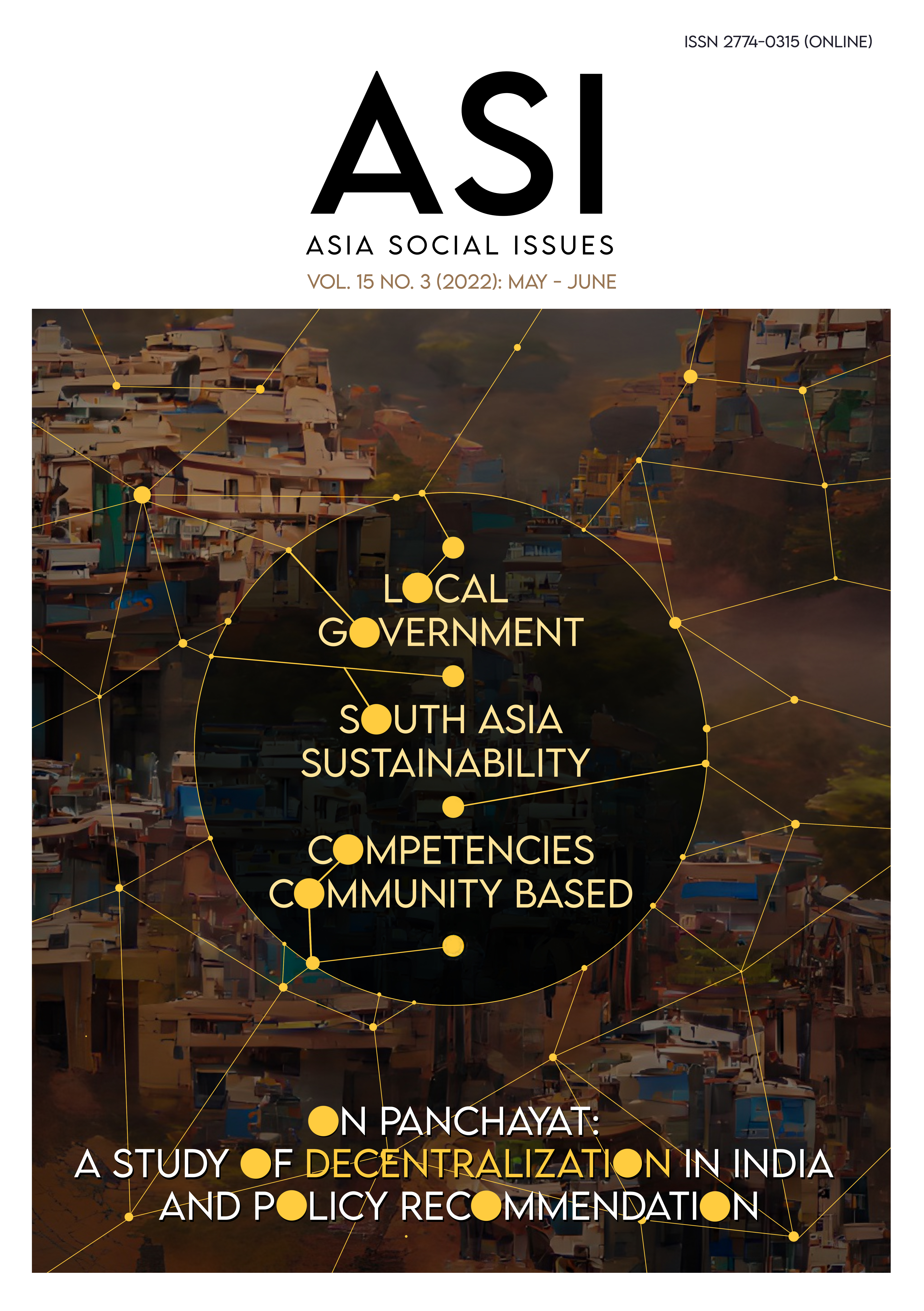An Appraisal of Husband’s Support for Contraceptive Use in Low Resource Setting of Chattogram City, Bangladesh
Main Article Content
Abstract
This study aimed to explore the current status concerning the roles of husbands in family planning and to identify the associated factors in the slum areas of Chattogram city in Bangladesh. A community-based cross-sectional study was conducted among the women living in different slums (N = 400) of Chattogram city. Data were collected using a structured and facilitator-administered questionnaire. Cross tabulation with chi-square tests and multivariate logistic regression analyses were performed using IBM SPSS version 24.0. This study revealed that 70.5% of the husbands supported wives’ contraceptive use. This study explored that husbands’ having education (OR = 2.45, 95% CI: 1.42-4.22), having two children (OR = 0.37, 95% CI: 0.18-0.76) and more than two children (OR = 0.21, 95% CI: 0.09-0.50), more utility facility in the slum areas (OR = 2.32, 95% CI: 1.15-4.68), a good relationship between husband and wife (OR = 1.97, 95% CI: 1.13-3.44), commencing reproductive health communication after the birth of the second child (OR = 0.43, 95% CI: 0.19-0.99), respondents’ having moderate knowledge on RH (OR =4.46, 95% CI: 2.10-9.46) and husbands’ visiting any health center to take wives’ reproductive health care (OR = 2.08, 95% CI: 1.06-4.09) were the predictors for supporting their wives in terms of contraceptive use.
Article Details
Copyright: CC BY-NC-ND 4.0
References
Adams, A. M., Islam, R., & Ahmed, T. (2015). Who serves the urban poor? A geospatial and descriptive analysis of health services in slum settlements in Dhaka, Bangladesh. Health Policy and Planning, 30(suppl 1), i32-i45.
Ahmed, S. M., Hossain, A., Khan, M. A., Mridha, M. K., Alam, A., Choudhury, N., & Bhuiya, A. (2010). Using formative research to develop MNCH programme in urban slums in Bangladesh: experiences from MANOSHI, BRAC. BMC Public Health, 10(633), 1-8.
Bangladesh Bureau of Statistics. (2015). Census of slum areas and floating population 2014. Dhaka, Bangladesh: Bangladesh Bureau of Statistics.
Barua, A., Pande, R. P., MacQuarrie, K., & Walia, S. (2004). Caring men? Husbands’ involvement in maternal care of young wives. Economic and Political Weekly, 39(52), 5661-5668.
Choudhury, N., Moran, A. C., Alam, M. A., Ahsan, K. Z., Rashid, S. F., & Streatfield, P. K. (2012). Beliefs and practices during pregnancy and childbirth in urban slums of Dhaka, Bangladesh. BMC Public Health, 12(791), 1-6.
Drennan, M. (1998). Reproductive health: New perspectives on men’s participation. Population Reports Series J: Family Planning Programs, Oct(46), 1-35.
Islam, M. S. (2013). Determinants of contraceptive method choice in Bangladesh: Male perspectives. South East Asia Journal of Public Health, 3(1), 50-56.
Jahan S. A., Thwin, A. A., Tunon, C., & Nasreen, S. (1996). Urban men and their participation in modern contraception. Dhaka, Bangladesh: International Centre for Diarrhoeal Disease Research.
Kamal, M. M., Islam, M. S., Alam, M. S., & Hassan, A. B. M. (2013). Determinants of male involvement in family planning and reproductive health in Bangladesh. American Journal of Human Ecology, 2(2), 83-93.
Khatun, F., Rasheed, S., Moran, A. C., Alam, A. M., Shomik, M. S., Sultana, M., & Bhuiya, A. (2012). Causes of neonatal and maternal deaths in Dhaka slums: Implications for service delivery. BMC Public Health, 12(1), 1-9.
Maharaj, P. (2000). Promoting male involvement in reproductive health agenda. Empowering Women for Gender Equity, 44, 37-47.
Mberu, B. U., Haregu, T. N., Kyobutungi, C., & Ezeh, A. C. (2016). Health and health-related indicators in slum, rural, and urban communities: A comparative analysis. Global Health Action, 9(1), 1-13.
Nahar, S., Banu, M., & Nasreen, H. E. (2011). Women-focused development intervention reduces delays in accessing emergency obstetric care in urban slums in Bangladesh: A cross-sectional study. BMC Pregnancy and Childbirth, 11(1), 1-10.
Nasreen, H. E., Leppard, M., Mamun, M. A., & Salam, S. S. (2012). Men’s knowledge and awareness of maternal, neonatal and child health care in rural Bangladesh: Do they differ from Women? Reproductive Health, 9(18), 1-9.
National Institute of Population Research and Training. (2008). 2006 Bangladesh Urban Health Survey. Dhaka, Bangladesh: National Institute of Population Research and Training.
National Institute of Population Research and Training. (2015). Bangladesh Urban Health Survey 2013 Final Report. Dhaka, Bangladesh: National Institute of Population Research and Training.
National Institute of Population Research and Training. (2016). Bangladesh Demographic and Health Survey 2014. Dhaka, Bangladesh: National Institute of Population Research and Training.
Rogers, E. M. (1973). Communication strategies for family planning. New York: Free Press.
Shahjahan, M., Mumu, S. J., Afroz, A., Chowdhury, H. A., Kabir, R., & Ahmed, K. (2013). Determinants of male participation in reproductive healthcare services: A cross-sectional study. Reproductive Health, 10(27), 1-6.
UN-Habitat (2013). State of the World’s cities 2012/2013: prosperity of cities. Cambridge, UK: United Nations Human Settlements Programme.
UN-Habitat (2016). World Cities Report 2016. Nairobi, Kenya: UN-Habitat.
UNICEF, Bangladesh. (2010). Understanding urban inequalities in Bangladesh: A prerequisite for achieving Vision 2021. Dhaka, Bangladesh: UNICEF.
Zakaria, M. (2015). Women’s perception on male involvement in reproductive health in rural and urban Bangladesh: A comparative study. Journal of Rural Development, 40(1), 67-90.
Zakaria, M., & Bhuiyan, M. M. (2016). Determinants of male involvement in women’s reproductive health: A multilevel study in Bangladesh. Malaysian Journal of Public Health Medicine, 16(3), 211-218.
Zakaria, M., Khan, A. K. M. Z. R., Ahmad, M. S., Cheng, F., & Xu, J. (2021). Women’s perception of male involvement in antenatal, childbirth and postnatal care in urban slum areas in Bangladesh: A community-based cross-sectional study. Healthcare, 9(4), 1-11.


